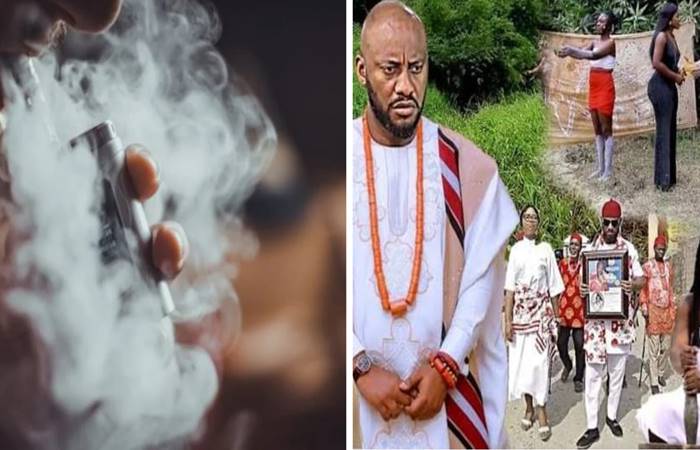
Nollywood: FG’s Ban on Smoking and Ritual Scenes Sparks Debate Among Industry Stakeholders.
The Federal Government’s plan to ban depictions of money rituals, ritual killings, smoking, and the glamorization of such vices in Nigerian films has sparked a lively debate among Nollywood stakeholders. This directive was recently announced by Dr. Shaibu Husseini, the Executive Director/CEO of the National Film and Video Censors Board (NFVCB), during a national stakeholders’ engagement on smoke-free Nollywood held in Enugu.
The event, co-organized by the NFVCB and Corporate Accountability and Public Participation Africa (CAPPA), gathered an array of movie producers, directors, actors, and leaders from various guilds and associations across the Nigerian film industry. Husseini emphasized the urgent need to address the glamorization of smoking, ritual activities, and killings in Nigerian films, describing it as an industry emergency that requires bold and ambitious actions from all stakeholders.
Husseini stated, “When my predecessor approached the former Minister of Information, Alhaji Lai Muhammed, on the need to make subsidiary legislation to curtail the display of smoking in Nigerian movies, he saw the need to include money rituals. Others included in the regulation are ritual killings and the glamorization of other crimes, in order to further sanitize the film industry.”
The minister of Arts, Culture, and Creative Economy, Hannatu Musawa, has approved the regulation under section 65 of the NFVCB Act 2004. The newly approved regulation, titled “Prohibition of Money Ritual, Ritual Killing, Tobacco, Tobacco Products, Nicotine Products Promotion, and Glamorization Display of Crimes in Movies, Musical Videos and Skits Regulations 2024,” has been forwarded to the Federal Ministry of Justice for official gazette.
The primary aim of the sensitization program is to educate stakeholders on the dangers of glamorizing smoking in Nigerian movies. Husseini highlighted the negative influence on teenagers and young adults, who form the largest segment of the Nigerian movie audience, aside from the health implications. The board plans to conduct extensive enlightenment programs in secondary schools, tertiary institutions, local communities, faith-based groups, and other institutions.
SEE THIS: Nigerian House of Representatives to Translate Science Textbooks into Local Languages
“As you all know, the film industry occupies a central position in the entertainment and creative sector, and it is imperative that we continue to place the highest premium on the progress of the film industry. The NFVCB supports smoke-free movies and smoke-free Nollywood. Therefore, we seek your collaboration to develop creative content that discourages smoking and promotes positive health messages,” Husseini added.
Despite the NFVCB’s efforts, stakeholders in the industry remain divided over the policy. Actors, actresses, and other industry practitioners have expressed divergent opinions on the matter.
Veteran Nollywood actor Bob Manuel Udokwu believes that the restrictions on smoking and other practices like ritual scenes are being misconstrued as an outright ban. “The Federal Government, through the NFVCB, is ensuring that filmmakers are not inadvertently promoting smoking and ritual acts in films. They can be done when it becomes compelling to tell stories like in documentaries and true life stories,” he explained. Udokwu emphasized that the NFVCB is already engaging with movie makers to clarify the government’s new stance and that practitioners support the move.
On the other hand, Nollywood actress Jennifer Obodo feels that the government should focus on more pressing issues. “Movies are make-belief; a form of interpretation of a story and not just the narrative itself. If the government wants to ban smoking, then it should start by banning the sale or production of cigarettes. What is the essence of parental guidance in movies?” Obodo questioned. She believes the government should address more critical issues like the high cost of living, poor infrastructure, and security challenges rather than focusing on Nollywood.
Actress Ngozi Eze Evuka also opposes the ban, arguing that movies are meant to educate and entertain, not corrupt viewers. “When you start banning these acts, very soon the FG will ban sexual acts, witchcraft acts, native doctor acts, and so many other acts in Nollywood. So I don’t support it one bit,” she said. Evuka believes the government should concentrate on the educational sector to help children understand that movies are fictional.
Nnaemeka Charles Eze (Nani Boi) criticized the government for prioritizing the ban amid numerous national challenges. “Much as I believe that the Federal Government wants the best for its citizens, I do not think this should be their priority at a time when it looks like nothing is working in the country,” he stated. Eze suggested finding a better way to address the issue, such as establishing a body to ensure movies meet certain standards without compromising artistic expression.
ALSO SEE: Water And Garri (2024) – Nollywood Movie
Conversely, Nelson Bright sees the ban on smoking in movies as a positive step in combating human trafficking and illegal organ harvesting. However, he also pointed out the disadvantages, such as stifling artistic expression and driving talented filmmakers away from Nigerian cinema due to stringent restrictions.
Don Sylvester Nweke, CEO of Don Sylvester Records and a patron of the Association of Movie Producers and Nollywood in Lagos, argued that the ban is unnecessary. He suggested that films portraying smoking or ritual acts should end with the characters being punished to serve as a deterrent. “If you stop it in Nigerian films, what about the foreign films? Do you think Nigerians don’t watch foreign films?” Nweke questioned, highlighting the potential ineffectiveness of the ban.
Maxi Okwu, former national chairman of the All Progressives Grand Alliance (APGA), raised concerns about the infringement of fundamental rights. “The government might seem to have a good point in trying to enforce the ban, but the constitution guarantees every Nigerian the freedom of thought, conscience, and religion. You cannot make a law that derogates from fundamental rights,” he argued.
As the debate continues, it is clear that the Federal Government’s ban on smoking, ritual scenes, and the glamorization of crimes in Nollywood films has elicited a wide range of opinions. While some stakeholders see the move as necessary for protecting public health and morals, others view it as an overreach that infringes on creative freedom and fundamental rights. The resolution of this issue will likely require further dialogue and compromise between the government and the Nollywood community.


















